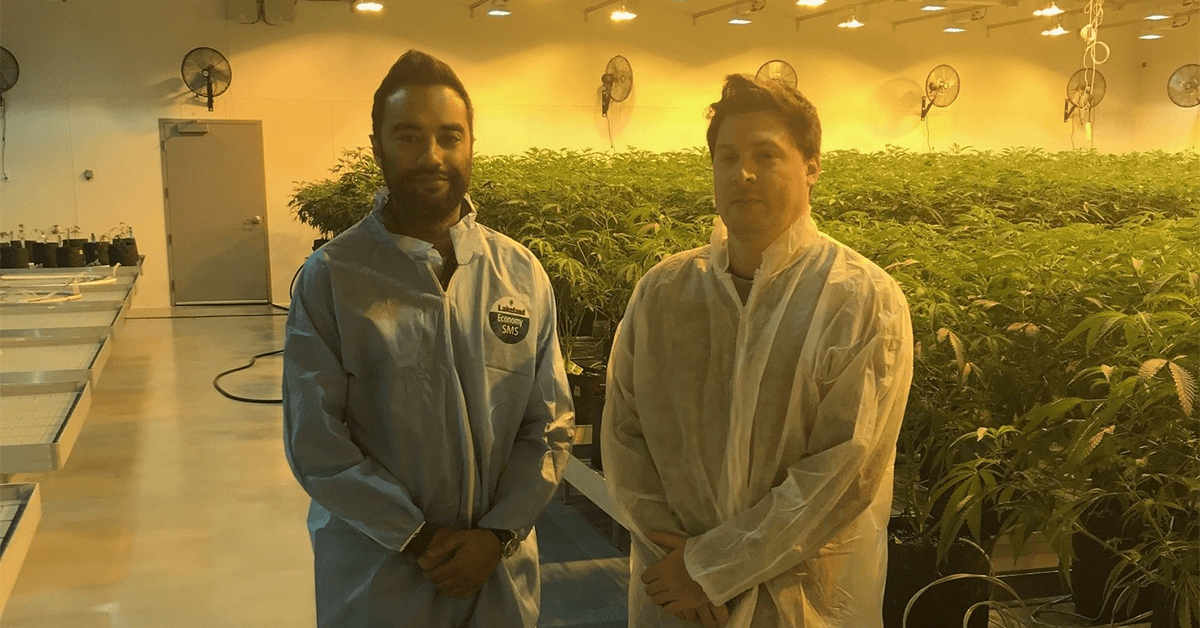Building a Cannabis Empire: Inside C3 Industries' Expansion Strategy

C3 Industries, a Michigan-based cannabis company, was founded in 2018 by brothers Ankur and Vishal Rungta. In a few short years, it has expanded significantly. Initially starting in one state, C3 now operates in five states, with plans to enter a sixth soon. The company manages 24 High Profile dispensaries across Michigan, Missouri, Massachusetts, Illinois, and New Jersey, with Connecticut set to join the list. Additionally, C3 oversees more than 250,000 square feet of cultivation and manufacturing space across these states, although Illinois and New Jersey currently function as retail-only markets.
The company's brand portfolio includes Cloud Cover, Galactic, and Habitat, each offering a diverse range of cannabis products catering to different tastes, potency levels, and price points. This diverse operational footprint highlights C3's aggressive yet strategic expansion, demonstrating its capability to scale operations while adapting to varying state laws and market conditions.
Overcoming Industry Challenges
Despite C3 Industries' rapid expansion and success, the journey has not been without its significant challenges, common to all entrepreneurs in the cannabis industry. The company's ability to navigate these obstacles sets it apart from others that may have chosen different paths regarding the pace and scale of their expansion.
In a conversation with Cannabis Business Executive, the founders, Ankur and Vishal Rungta, shared insights into the formation and evolution of their business philosophy. Ankur Rungta remarked on the genesis of their venture, recalling their time at the University of Michigan, a period that coincided with Ann Arbor's emergence as a hub for the cannabis industry. This early exposure, coupled with their subsequent careers in corporate finance and investment banking, fueled their entrepreneurial spirit and equipped them with a robust skill set crucial for navigating the complex cannabis market.
The brothers emphasized that while they developed their careers, they simultaneously nurtured the idea of entering the cannabis space—a sector they were both passionate about and familiar with. The decision to leave the corporate world came after engaging in consulting projects that solidified their resolve to create a business in an industry they believed had significant potential.
Strategic Shifts and Market Adaptation
The strategic journey of C3 Industries began in Oregon, a state known for its early saturation and challenging market conditions. Ankur Rungta explained that Oregon was the incubator for their initial business ideas, which included a focus on high-quality cannabis cultivation. Initially, they envisioned a large wholesale operation, but the realities of the Oregon market—characterized by oversupply and plummeting prices—taught them valuable lessons about the viability of wholesale-only business models in competitive cannabis markets.
This experience led to a pivotal shift in their business strategy. While they had initially planned to focus solely on production, the harsh market conditions in Oregon prompted a reevaluation of their approach. They recognized the necessity of vertical integration, particularly in competitive markets, to maintain control over both production and retail. This realization influenced their decision to expand their business model to include retail operations, not just in Oregon, but also as they moved into other states.
Ankur noted that this shift wasn't just about adapting to one state's market conditions but was a strategic evolution that shaped their approach as they expanded into new markets like Michigan and Missouri. The decision to develop vertically integrated operations in these states was driven by their Oregon experiences, underscoring the importance of flexibility and adaptation in their broader business strategy.
Evaluating Expansion and Market Entry
The growth of C3 Industries and its strategic adaptation in various markets have been characterized by a cautious yet opportunistic approach to expansion. When discussing the process of entering new markets and sizing up opportunities, Vishal Rungta highlighted the company's preference for a measured, organic growth strategy rather than aggressive acquisitions.
Vishal explained that entering a new market often involves high costs and significant risks, especially when purchasing an already operational platform. C3's strategy has been to target more organic opportunities, such as acquiring single retail licenses that are not yet operational and developing them from the ground up. This approach allows them to enter at a lower cost and with a clearer understanding of the developmental and performance risks involved.
Furthermore, the company's expansion strategy is not merely about geographical spread but achieving a substantial market presence. Vishal emphasized the importance of depth over breadth, suggesting that C3 aims to establish a significant presence in the markets they enter, rather than merely adding new locations to their portfolio. This strategy involves ensuring that they do not overextend themselves and that each new market entry is sustainable and adds value to their overall operations.
This cautious approach to expansion is contrasted with periods where the industry saw a rush for rapid growth, often at the expense of solid fundamentals. C3's strategy reflects a deliberate focus on building a stable and profitable platform before venturing into new territories.
Navigating Competitive Markets and Financial Health
C3 Industries' approach to competitive markets has been informed by both their initial experiences in Oregon and their ongoing operations in Michigan, Missouri, and Massachusetts. Ankur Rungta shared that each state presents unique challenges, but their strategy of building a vertically integrated model has proved beneficial. This model not only provides control over the entire supply chain but also enhances their ability to compete effectively in diverse regulatory and market environments.
In Michigan, for example, where the company has a substantial presence, they have leveraged their large-scale production capabilities and extensive retail network to create a stable, profitable business. The state's uncapped market structure has fostered a highly competitive environment, yet C3 has managed to carve out a significant market share due to their strategic site selection and operational efficiency.
Furthermore, their financial strategy has been equally prudent. Ankur highlighted their low-leverage approach, which contrasts sharply with the industry norm of high debt levels. This financial conservatism has allowed them to maintain a healthy balance sheet and generate substantial cash flow, which is crucial for sustaining growth and navigating the cyclical challenges of the cannabis industry.
C3's ability to generate strong revenue while maintaining healthy EBITDA margins underscores their strategic acumen and operational efficiency, positioning them well for future growth and potential market shifts.
The Future of Cannabis Retail and Branding
As the cannabis market evolves, branding and consumer loyalty are becoming increasingly significant. Ankur Rungta reflected on the current state of the market, noting that while there is a strong focus on price and THC content, there's potential for a shift towards brand differentiation and loyalty as the market matures and consumers become more informed.
The discussion also highlighted that the market is still relatively commoditized, especially in the value segments. However, C3 Industries is preparing for a future where branding could play a more critical role. They've adopted a strategy categorized as "good, better, best," aiming to cater to various consumer segments with different brands each representing distinct value propositions and price points.
Vishal Rungta added that their approach is to align their brands with consumer expectations and market trends. While currently, the emphasis remains on potency and pricing due to consumer demand, they anticipate that this will evolve as the market matures, leading to greater opportunities for premium branding strategies.
This forward-looking approach suggests that C3 Industries is not just reacting to current market conditions but is actively preparing for future shifts in consumer behavior and market dynamics. This strategy may enable them to establish a strong brand presence that can command loyalty and premium pricing in a more mature and competitive market.
Long-term Vision and Strategic Market Positioning
As C3 Industries looks toward the future, the discussion shifts to broader strategic goals and market positioning. The company's emphasis on maintaining a strong and diversified presence in their chosen markets aligns with their long-term vision to build a robust and resilient business capable of weathering market fluctuations and capitalizing on new opportunities.
Ankur Rungta expressed confidence in their strategic market approach, emphasizing the importance of depth over mere geographical expansion. This depth ensures that their market entries are not only about establishing a presence but also about achieving significant market penetration and influence, which are critical for long-term success.
The company's focus on operational excellence and strategic growth has also allowed them to explore potential expansions into new states like Ohio and keep an eye on evolving markets in the Carolinas. This cautious yet opportunistic approach to expansion reflects their desire to build a sustainable business model that can thrive in the dynamic cannabis industry.
Furthermore, C3 Industries' ability to adapt to market conditions—whether through adjusting their business model in response to lessons learned in Oregon or through their strategic financial management—illustrates their commitment to a prudent growth strategy that prioritizes financial health and operational stability.
Reflections on Building a Family Business in the Cannabis Industry
As C3 Industries continues to navigate the complexities of the cannabis market, the personal reflections of Ankur and Vishal Rungta add a human element to their business journey. They shared their motivations and the unique challenges of building a business in an emerging and highly regulated industry. Their close-knit partnership as brothers has not only strengthened their resolve but has also been a source of inspiration and resilience.
Building C3 Industries from the ground up has been a labor of love and dedication for the Rungtas. Ankur emphasized the importance of building a business that reflects their values and vision, underscoring their commitment to ethical practices and a responsible growth strategy. This approach has allowed them to cultivate a company culture that values innovation, responsibility, and long-term planning.
Moreover, their strategic decision-making has been deeply influenced by their desire to maintain a stable and healthy business rather than pursuing rapid expansion at the expense of quality and sustainability. This thoughtful approach to growth and expansion reflects their broader goals of building a lasting legacy in the cannabis industry that goes beyond immediate financial gains.
The Rungtas' journey highlights the potential for family-run businesses to make a significant impact in the cannabis sector, driven by a shared vision and a commitment to ethical entrepreneurship.
Conclusion and Outlook for C3 Industries
As C3 Industries looks forward, the company stands on a strong foundation, marked by strategic growth, operational excellence, and a keen understanding of the cannabis market's dynamics. The Rungta brothers have successfully navigated the complexities of a rapidly evolving industry by emphasizing vertical integration, financial prudence, and market adaptability.
Their approach to business growth, deeply rooted in their personal experiences and professional backgrounds, demonstrates a model of sustainable development in the cannabis industry. C3 Industries' strategy of careful expansion, focus on vertical integration, and commitment to building a solid operational base has prepared them well for future challenges and opportunities.
As the cannabis industry continues to mature, with potential changes in regulations and consumer preferences, C3 Industries is well-positioned to capitalize on these shifts. Their proactive approach to market entry, brand development, and financial management will likely continue to serve them as key advantages in a competitive landscape.
The company's journey from a fledgling startup to a multi-state operator illustrates the potential for strategic foresight and conservative financial management to create a resilient and profitable business in the ever-changing cannabis industry.
Share this article:
Spotted a typo, grammatical error, or a factual inaccuracy? Let us know - we're committed to correcting errors swiftly and accurately!











 Helpful Links
Helpful Links